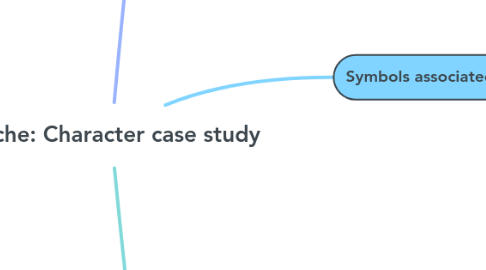
1. Key events in her past:
1.1. The death of her husband - Allen Gray -> Was a homosexual and committed suicide as Blanche said "You disgust me." -> Representative of Old, Antebellum Southern values.
1.1.1. Motif of the Varsouviana Polka -> It was playing during Allan's death and is a symbol of Blanche's mental decline as she loses her grip on reality. The cyclical nature of it portrays the cycle of self-destruction Blanche is in.
1.2. Fired from being a highschool teacher due to her relationship with a pupil - "A seventeen year old boy! She got mixed up with." (Stanley to Stella)
1.2.1. Obsession with youth - "Young young young boy." (Blanche to the paper boy) -> Stems from her deep-rooted insecurity of being an ageing Southern Belle. Also a result of her inability to move on from the death of her husband
1.2.1.1. Links to theme of sexual desire: "Come over here like I told you too!" -> Imperative shows Blanche's true self, and how she can be just as aggressive as Stanley.
1.3. The Loss of Belle Reve: "The loss... The loss!"
1.3.1. Foregrounds the tension within the play - Old South vs New South. "The Kowalski's and Dubois have different notions!" (Blanche)
1.3.1.1. Stella becomes a battleground between Stanley and Blanche, and thus the Old South vs New South
1.3.2. Symbolises the destruction of the Old, Antebellum South and the birth of the New Industrialised South. Blanche's mental deterioration emphasises this as she embodies all of the old Southern values.
2. Symbols associated with her:
2.1. Light (The absence of it)
2.1.1. Blanche avoids appearing in bright light as it symbolises the exposure of her deceit.
2.1.1.1. She covers the light in the Kowalski apartment with a "Paper Lantern". -> "I can't stand a naked lightbulb." - She doesn't want her Southern Belle facade to be exposed to Mitch, as well as her past.
2.1.1.1.1. Stanley "tearing" the Paper Lantern off of the lighbulb is the ultimate act of systematically destroying all of her fantasies. Her mental state is completely destroyed and her past fully exposed. Stanley, and the New South, has won in this war.
2.2. Bathing
2.2.1. It is a common symbol in literature to portray 'cleansing', usually of guilt or sin. The same applies for Blanche.
2.2.1.1. Blanche uses bathing to try and cleanse herself of her odious history, but she cannot get rid of it, as symbolised through her bathing never being completed.
2.2.1.1.1. "She's soaking in a hot tub to quieten her nerves. She's terribly upset" (Stella to Stanley in Scene 1). Her need to cleanse herself from her past is akin to Lady Macbeth in Shakespeare's play. The fact that she must take a bath to quiten her nerves suggests a mental vulnerability that will lead to her madness.
2.2.1.1.2. "Hello Stanley! Here i am, all freshly bathed and scented, and feeling like a brand new human being!" (Blanche Scene 2)
2.2.1.1.3. "Blanche is singing in the bathroom a sacchrine popular ballad which is used contrapuntally to Stanley's speech" (Stage directions, Scene 7) -> Stanley exposes to Stella her sister's sexualy permissive past whilst Blanche is oblivious to it. The Bathroom becomes Blanche's refuge from reality.
2.3. Alcohol
2.3.1. Blanche uses alcohol as a coping and escape mechanism from her past and present.
3. Key themes:
3.1. Desire and Destruction
3.1.1. Blanche is fated from the outset as she boards the 'streetcar named desire' as she dreams of desire that cannot be fulfilled or reciprocated. Her life reveals a string of failed affairs where she has not been desired in a way that fulfils her expectations.
3.1.1.1. Blanche's journey, first to desire then to Cemeteries, sums up her life, driven by a sexual passion and finally ending up in the 'living death' of the asylum.
3.1.2. She desires to be the Southern Belle, yet she fundamentally can't be like this.
3.1.2.1. The traditional southern belle was expected to be submissive and virtuous. However, Blanche completely subverts this and therefore represents a decaying southern belle. She struggles with what she should be and what she has become.
3.2. The Old South vs New America
3.2.1. Blanche is representative of the Old, Antebellum South, who is pitted against Stanley, the New America.
3.2.1.1. The use of derogatory terms towards Stanley such as "Polack" symbolises her outdated, xenophobic views which she is unwilling to move on from.
3.2.1.1.1. It is this inability to move on which ultimately leads to her demise.
3.2.1.2. The Rape Scene at the end of the play symbolises the complete destruction of the Old South by the New South.
3.2.1.2.1. "We've had this date from the beginning." -> Could be interpreted as it was inevitable that the birth of the New America would systematically destroy the Old South.
3.3. Illusion vs Reality
3.3.1. Blanche's lies throughout the play
3.3.1.1. Alcoholism
3.3.1.2. Her past with the seventeen boy from school.
3.3.1.3. Lying about her age to Mitch
